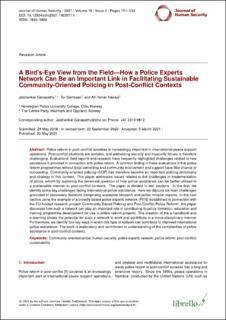A Bird’s-eye view from the field: how a police experts network can be an Important link in facilitating sustainable community-oriented policing inpPost-conflict context
| dc.contributor.author | Ganapathy, Jaishankar | |
| dc.contributor.author | Damkaas, Tor | |
| dc.contributor.author | Naesje, Alf Halvar | |
| dc.date.accessioned | 2023-03-22T12:05:32Z | |
| dc.date.available | 2023-03-22T12:05:32Z | |
| dc.date.issued | 2021 | |
| dc.identifier.issn | 1835-3800 | |
| dc.identifier.uri | https://hdl.handle.net/11250/3059832 | |
| dc.description | Doi'en fungerer ikke. | en_US |
| dc.description.abstract | Police reform in post-conflict societies is increasingly important in international peace support operations. Post-conflict situations are complex and addressing security and insecurity issues is therefore challenging. Evaluations, field reports and research have frequently highlighted challenges related to how assistance is provided in connection with police reform. A common finding in these evaluations is that police reform programs without local ownership and community involvement and support have little chance of succeeding. Community-oriented policing (COP) has therefore become an important policing philosophy and strategy in this context. This paper addresses issues related to the challenges in implementation of police reform by exploring the perennial question of how police assistance can be better utilised in a sustainable manner in post-conflict contexts. The paper is divided in two sections. In the first, we identify some key challenges facing international police assistance. Here we discuss six main challenges grounded in secondary literature comprising academic research and police mission reports. In the next section using the example of a broadly based police experts’ network (PEN) established in connection with the EU-funded research project ‘Community-Based Policing and Post-Conflict Police Reform’, the paper discusses how such a network can play an important role in contributing to policy formation, education and training- programmed development for use in police reform projects. The creation of the e-handbook and e-learning shows the potential for such a network to work and contribute in a cross-disciplinary manner. Furthermore, we identify four keyways in which this type of network can contribute to improved international police assistance. The work is exploratory and contributes to understanding of the complexities of police assistance in post-conflict contexts. | en_US |
| dc.language.iso | eng | en_US |
| dc.publisher | Librello Publishing House | en_US |
| dc.subject | community-oriented policing | en_US |
| dc.subject | human security | en_US |
| dc.subject | police experts network | en_US |
| dc.subject | police reform | en_US |
| dc.subject | post-conflict | en_US |
| dc.subject | sustainability | en_US |
| dc.subject | nærpoliti | en_US |
| dc.subject | menneskelig sikkerhet | en_US |
| dc.subject | politieksperter | en_US |
| dc.subject | nettverk | en_US |
| dc.subject | politireform | en_US |
| dc.subject | post-konflikt | en_US |
| dc.subject | bærekraft | en_US |
| dc.title | A Bird’s-eye view from the field: how a police experts network can be an Important link in facilitating sustainable community-oriented policing inpPost-conflict context | en_US |
| dc.type | Peer reviewed | en_US |
| dc.type | Journal article | en_US |
| dc.description.version | publishedVersion | en_US |
| dc.source.pagenumber | 111-133 | en_US |
| dc.source.volume | 16 | en_US |
| dc.source.journal | Journal of Human Security | en_US |
| dc.source.issue | 2 | en_US |
| dc.identifier.doi | 10.12924/johs2021.16020111 |
